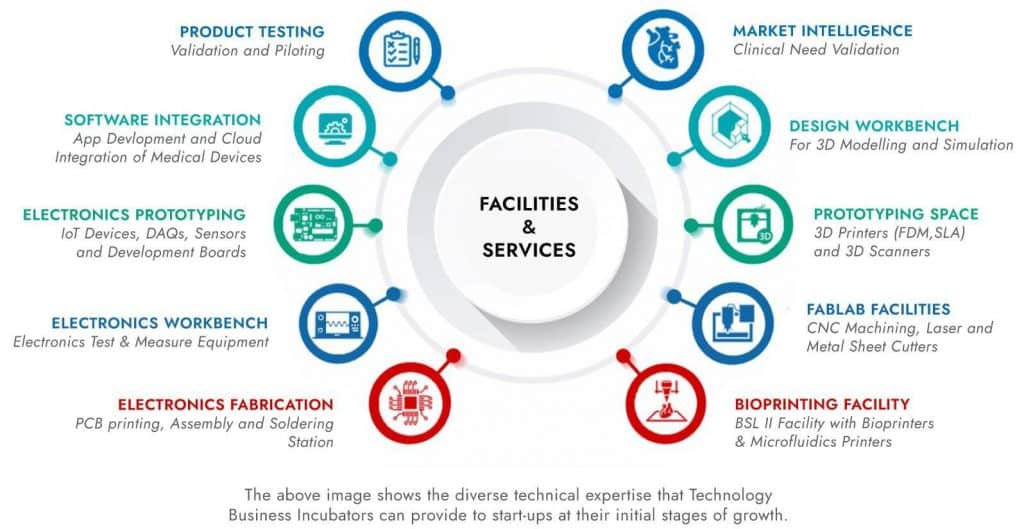

Technology Business Incubators are technology service companies with extensive insight into the product development cycle from concept to commercialization. This insight compels start-ups to adopt newer technologies to personalise products for better customer experiences, enabling them to thrive faster.
If your start-up is in its initial stages, technical experts can help build your prototype with their experience in a short span. Here are a few ways Technology Business Incubators impact start-ups’ evolution positively and at an accelerated pace.
Overlooking technology’s role in revolutionising big and small business operations is a dangerous anti-growth mindset. Optimal fast-track technology employed with expert insight has the potential to create new opportunities for start-ups in their amateur years. Innovative technological tools like Agile Software Development, Cloud Computing, Automation Testing, Product Tracking, and Data Analytics are extensively used by technical experts to develop applications that employees conveniently use for expressed purposes.
With the objective of transfer or commercialization of technology, TBIs stimulate the early growth of start-ups by providing them with speed, scalability, and adaptability throughout their partnership. Moreover, studies have shown that having access to high-end technological expertise promotes the expansion of technology-based new firms and significantly improves their survival rate.
Budding entrepreneurs lack experienced in-house resources that can help them implement technological systems and software. Technology Business Incubators aim to establish a meaningful partnership with start-ups to help them build and optimise advanced technologies. Technology partnerships can give platform integration services to start-ups that want to employ IT systems from diverse companies and assist them with the seamless implementation of product development stages.
After a systemised and flexible collaboration process, TBIs set up scrum teams to initiate a step-by-step product development process entailing strategy, consulting, and execution. A transparent and ambitious partnership helps in the stages of ideation, building an MVP prototype, formulating proof of concept, product testing, and eventual consumer outreach.
One of the most beneficial aspects of working with Technology Business Incubators is that start-ups will receive access to critical technical expertise at a low cost that they would otherwise be unable to acquire due to limited funds or capital. Since technology has penetrated the operations of every industry, from agriculture to travel, new businesses must start investing early in cost-effcient advanced technologies to reach their customers.
Most of the expertise and software like Continuous Integration and Continuous Delivery (CI/CD) are difficult and costly to adopt and maintain. Still, with the help of TBIs, start-ups can use technology to not only execute smoothly but also cut down additional costs at the initial stages. For instance, technical marketing tools can make managing easier while also eliminating the cost of engaging with an advertising firm.
Time-to-market has become a crucial product development metric since research has shown that startup entrants have achieved a significant advantage over their competitors in sales growth, decreased R&D costs, and market share by fast-tracking their development strategies. Launching the product or service at the correct time necessitates adaptation, fast learning, and resilience, all of which can be acquired through digital transformation.
TBIs can bring their technical skills to the advantage of your company. Many technologies like Agile development, QA, and testing can help you build an MVP prototype and uncover defects along the process. Whereas DevOps can help automate processes and reduce the time taken to do repetitive tasks. We can fine-tune your development process while also reducing time-to-market.
The backbone of business operations is your company’s ecosystem, which consists of the workforce, customers, and many applications used in day-to-day tasks. Technology Business Incubators help cultivate startup ecosystems by initiating experience-sharing, facilitating technology transfer, realising local economic advancement objectives, and promoting the formation and early growth.
TBIs set in motion technology-led and knowledge-driven start-ups by ensuring swift end-solutions to research outputs through dynamic tech. The customer’s end-to-end experience is centralised to build a flourishing ecosystem.
When deciding whether or not to partner with a Technology Business Incubator, remember that the five-year survival rate of start-ups with incubators has been estimated between 75 and 87 per cent. It is vital to ensure accelerated and continuous growth with speedy commercialisation of R&D output in a high-risk and high-reward business environment. TBIs help start-ups foster innovation, become DevOps ready, and create value-added services in the era of extensive globalisation and competition.
| Cookie | Duration | Description |
|---|---|---|
| __cf_bm | 1 hour | This cookie, set by Cloudflare, is used to support Cloudflare Bot Management. |
| _cfuvid | session | Calendly sets this cookie to track users across sessions to optimize user experience by maintaining session consistency and providing personalized services |
| cookielawinfo-checkbox-advertisement | 1 year | Set by the GDPR Cookie Consent plugin, this cookie records the user consent for the cookies in the "Advertisement" category. |
| cookielawinfo-checkbox-analytics | 11 months | This cookie is set by GDPR Cookie Consent plugin. The cookie is used to store the user consent for the cookies in the category "Analytics". |
| cookielawinfo-checkbox-functional | 11 months | The cookie is set by GDPR cookie consent to record the user consent for the cookies in the category "Functional". |
| cookielawinfo-checkbox-necessary | 11 months | This cookie is set by GDPR Cookie Consent plugin. The cookies is used to store the user consent for the cookies in the category "Necessary". |
| cookielawinfo-checkbox-others | 11 months | This cookie is set by GDPR Cookie Consent plugin. The cookie is used to store the user consent for the cookies in the category "Other. |
| cookielawinfo-checkbox-performance | 11 months | This cookie is set by GDPR Cookie Consent plugin. The cookie is used to store the user consent for the cookies in the category "Performance". |
| CookieLawInfoConsent | 1 year | CookieYes sets this cookie to record the default button state of the corresponding category and the status of CCPA. It works only in coordination with the primary cookie. |
| viewed_cookie_policy | 11 months | The cookie is set by the GDPR Cookie Consent plugin and is used to store whether or not user has consented to the use of cookies. It does not store any personal data. |
| wpEmojiSettingsSupports | session | WordPress sets this cookie when a user interacts with emojis on a WordPress site. It helps determine if the user's browser can display emojis properly. |
| Cookie | Duration | Description |
|---|---|---|
| li_gc | 6 months | Linkedin set this cookie for storing visitor's consent regarding using cookies for non-essential purposes. |
| lidc | 1 day | LinkedIn sets the lidc cookie to facilitate data center selection. |
| wp-wpml_current_language | session | WordPress multilingual plugin sets this cookie to store the current language/language settings. |
| yt-remote-cast-installed | session | The yt-remote-cast-installed cookie is used to store the user's video player preferences using embedded YouTube video. |
| yt-remote-connected-devices | never | YouTube sets this cookie to store the user's video preferences using embedded YouTube videos. |
| yt-remote-device-id | never | YouTube sets this cookie to store the user's video preferences using embedded YouTube videos. |
| yt-remote-fast-check-period | session | The yt-remote-fast-check-period cookie is used by YouTube to store the user's video player preferences for embedded YouTube videos. |
| yt-remote-session-app | session | The yt-remote-session-app cookie is used by YouTube to store user preferences and information about the interface of the embedded YouTube video player. |
| yt-remote-session-name | session | The yt-remote-session-name cookie is used by YouTube to store the user's video player preferences using embedded YouTube video. |
| ytidb::LAST_RESULT_ENTRY_KEY | never | The cookie ytidb::LAST_RESULT_ENTRY_KEY is used by YouTube to store the last search result entry that was clicked by the user. This information is used to improve the user experience by providing more relevant search results in the future. |
| Cookie | Duration | Description |
|---|---|---|
| _ga | 1 year 1 month 4 days | Google Analytics sets this cookie to calculate visitor, session and campaign data and track site usage for the site's analytics report. The cookie stores information anonymously and assigns a randomly generated number to recognise unique visitors. |
| _ga_* | 1 year 1 month 4 days | Google Analytics sets this cookie to store and count page views. |
| _gcl_au | 3 months | Google Tag Manager sets the cookie to experiment advertisement efficiency of websites using their services. |
| _li_id | 2 year | Leadinfo places two cookies that only provides Eastern Enterprise insights into the behaviour on the website. These cookies will not be shared with other parties. |
| Cookie | Duration | Description |
|---|---|---|
| bcookie | 1 year | LinkedIn sets this cookie from LinkedIn share buttons and ad tags to recognize browser IDs. |
| guest_id | 1 year 1 month | Twitter sets this cookie to identify and track the website visitor. It registers if a user is signed in to the Twitter platform and collects information about ad preferences. |
| test_cookie | 15 minutes | doubleclick.net sets this cookie to determine if the user's browser supports cookies. |
| VISITOR_INFO1_LIVE | 6 months | YouTube sets this cookie to measure bandwidth, determining whether the user gets the new or old player interface. |
| VISITOR_PRIVACY_METADATA | 6 months | YouTube sets this cookie to store the user's cookie consent state for the current domain. |
| YSC | session | Youtube sets this cookie to track the views of embedded videos on Youtube pages. |
| yt.innertube::nextId | never | YouTube sets this cookie to register a unique ID to store data on what videos from YouTube the user has seen. |
| yt.innertube::requests | never | YouTube sets this cookie to register a unique ID to store data on what videos from YouTube the user has seen. |
| Cookie | Duration | Description |
|---|---|---|
| __Secure-ROLLOUT_TOKEN | 6 months | Description is currently not available. |

